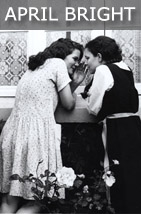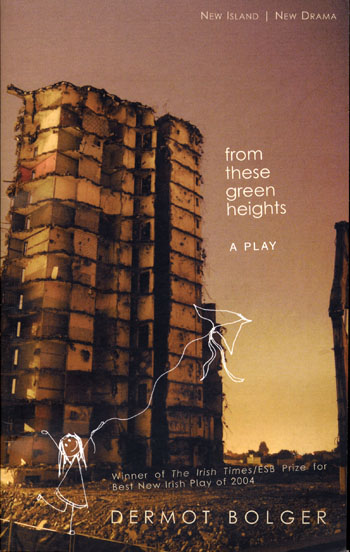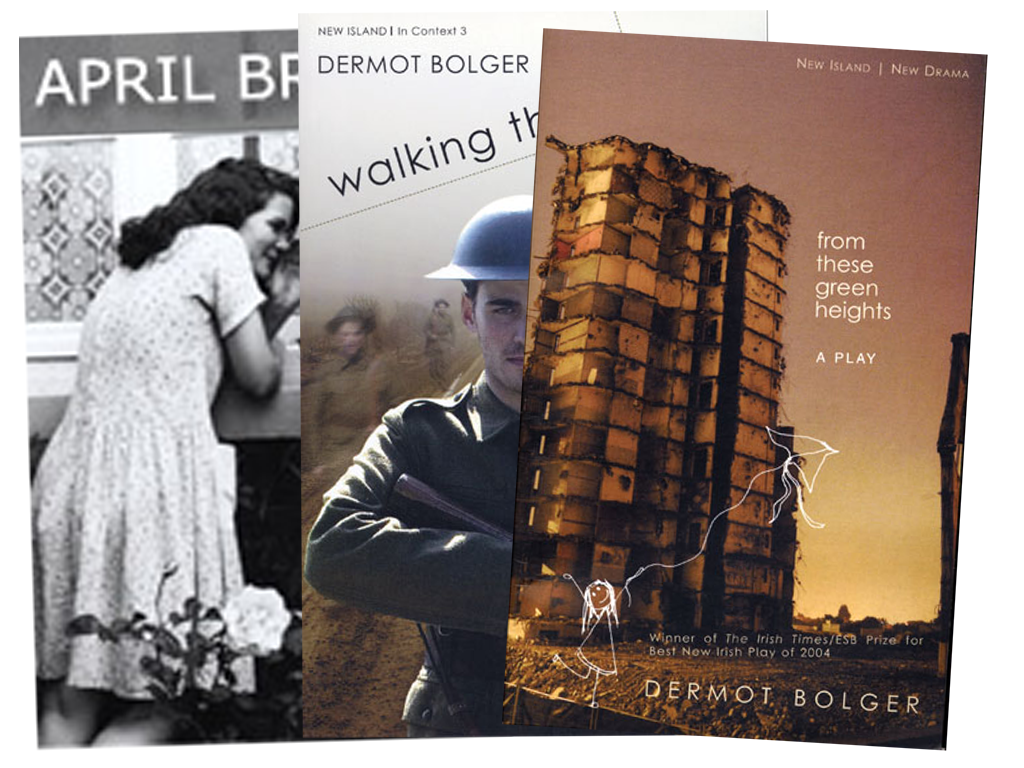Selected Popular Plays
Plays popular with amateur companies
April Bright
Cast size: two males and five females

Synopsis
On the night that a young couple, Sean and Anna, move into a small terraced house built seventy years ago, they are visited by a well-wisher who is Rosie Bright, one of two sisters who grew up in that house decades before. The story that she tells them (which also unfolds around them through a second ghostly set of characters whom they cannot see) is one of tragedy as Rosie recounts how her beloved elder sister died of TB. But it is also a story of hope in that it feels as if the child which Anna is carrying will finally fill the void left in the house and will be the child whom Rosie and April once dreamed about holding when they were girls, unaware of what the future held. It is a play about the past letting go of a house and the future taking possession of it.
Reviews
Less a haunting than an evocation, Bolger’s play explores the ordinary lives of both families – one marked by tragedy and the other by joy – as they struggle to find love and hope in sickness and in health, in birth and in death… April Bright is haunted by sorrow. Sometimes love and tenderness and sometimes fear and anxiety gleam beneath, but the memories are always cathartic. In this exploration of sorrow – both imprisoning and liberating – Bolger infuses the pain-wracked lives of two families living in the same house fifty years apart with a deeply effective lyricism, and offers a striking vision of personal reconciliation with the past and the present.
A shining example of theatre, April Bright is a thought-provoking and exciting play which should entertain and leave a lasting impression. The interchanging of times and personalities is always imaginative and at times stunning.
From These Green Heights
Cast size: two males and six females

Synopsis
Awarded the Irish Times/ESB Prize for Best New Irish Play of 2004, From These Green Heights is a kaleidoscopic journey through the lives of two Dublin families over four decades. It moves from the 1960s afternoon when Dessie, as a child, first glimpses the Ballymun Towers high-rise complex being built amid the fields of North Dublin, to the night in 2004 when he helps his young daughter pack up to leave the flat that has been his family home ever since then. Brilliantly theatrical and shifting seamlessly across almost forty years, it is the story of love and struggle, of tragedy and tenderness, balancing the lives of those who stayed and those who left but still carried the imprint of their native place in their hearts. It grows into a hidden history of modern Dublin life, exploring the relationship between a place which outsiders used to stigmatise its people and those people themselves who gradually begin to take possession of their own destinies, to fight to reshape that place, to see children born and die there, and to call it home.
Reviews
A towering production… a rare and special thing… Bolger’s rich, evocative language swells and surges, carrying the characters with confident ease through their multi-faceted and often arduous journeys. From These Green Heights is something to be treasured. It brings to life a pocket of Irish history which will now not be forgotten. Don’t miss it.
An important piece of social history that cannot be recommended highly enough.
The Lament for Arthur Cleary
Cast size: Three male and two female
Synopsis
The Lament for Arthur Cleary was Dermot Bolger’s debut play, which premiered at the 1989 Dublin Theatre Festival. Loosely having its origins in a re-imagining of the great Gaelic poem, Caoineadh Airt Uí Laoghaire (The Lament for Art Ó Laoghaire), it explores the relationship between a working-class Dubliner in his mid-thirties (who returns to that city after a decade working in factories in Europe and refuses to bow to the changes of a new Dublin which has been scarred by unemployment and heroin) and the nineteen year old girl who falls in love with him. It received the Samuel Beckett Award for best first play in Britain, The Stewart Parker BBC Award and An Edinburgh Fringe First Award.
Reviews
Breath-taking… there’s enough in the brilliant development of his drama to suggest that the vitality of Irish theatrical language is safe in his hands.
The Lament for Arthur Cleary is a joyous celebration of the old strumpet city itself, a love poem to the city of Dublin, to its people, its streets, its housing estates, but above all to that indomitable Dublin spirit.
Theatrically rich and socially powerful, it takes on the lineaments of an epic voyage, a voyage into the dark heart of a city where Irish theatre has seldom been before.
Walking the Road
Cast size: One male and one female

Synopsis
A century after his death, the poet and road worker Francis Ledwidge still haunts Irish literature. A determined Nationalist; he was killed by a stray shell while building a road behind the front line in Flanders, just before his thirtieth birthday. Walking the Road is one poet’s re-imagining of another poet’s life. Hovering in the half-light of memories, it vividly and imaginatively tries to follow Ledwidge on one final journey after his death as he finds himself once again walking the road that he once walked as a shop boy from Rathfarnham to his native Slane in County Meath on the night on which he wrote his first poem. Now, enduring the same walk again after his death, alongside him walk the ghosts of those who touched his life and the unseen ghosts of all the other young men – from Ireland, Germany and elsewhere – who died amid the mud of Flanders. But where are they walking to and will any of them ever reach home?
Details and Rights
For rights enquiries for these or other of Bolger’s plays please contact http://permissions.curtisbrown.co.uk/
Companies seeking reading copies of these plays or details of other plays are welcome to use the contact page on this website.
